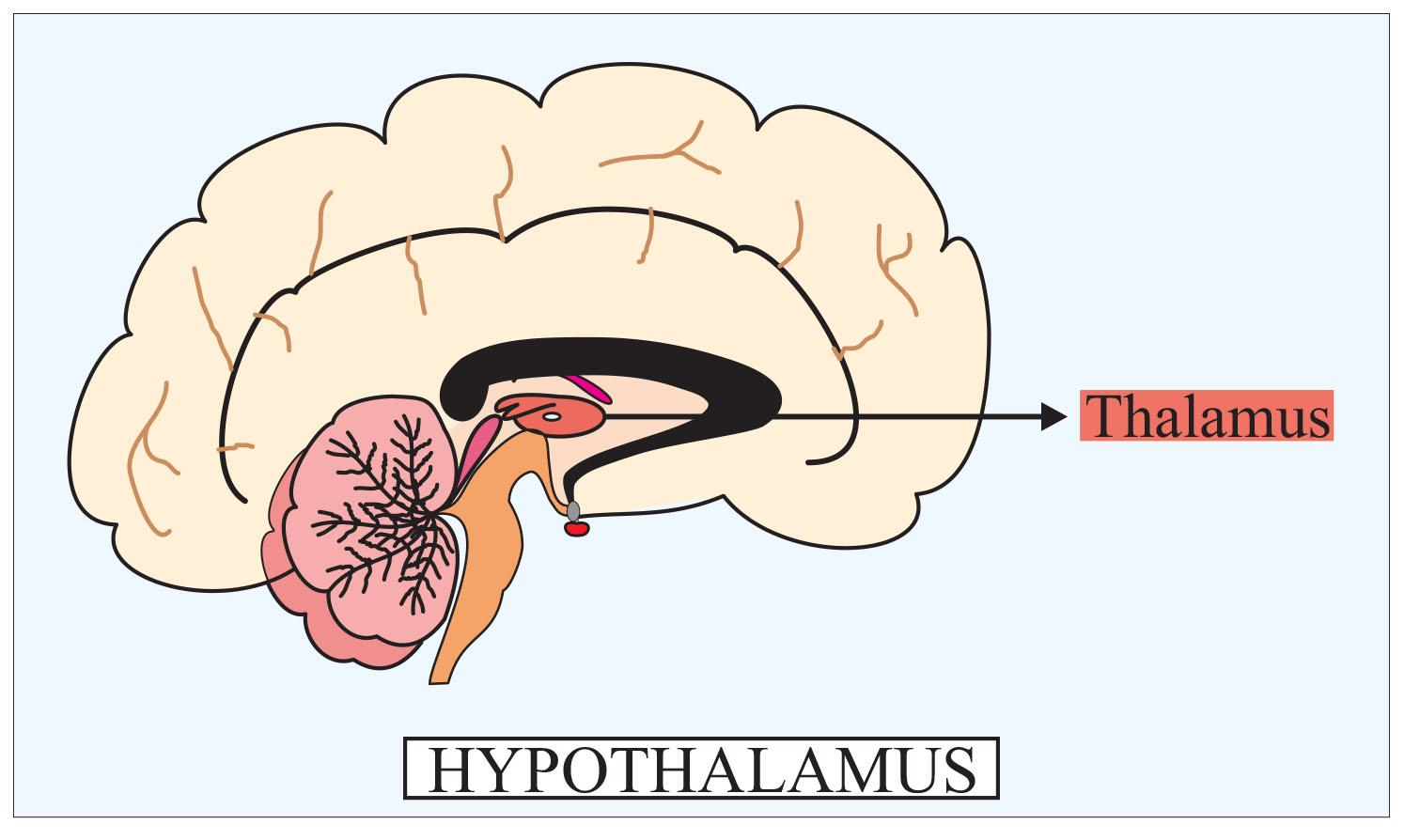
Osmoreceptors are present in-
(a)Hypothalamus
(b)Hypophysis
(c)Epiphysis
(d)Epithalamus
Answer
579.6k+ views
Hint: It's a small brain area. It is situated at the base of the brain, near the pituitary gland. Although it is very small, it plays a crucial role in many important functions, including the release of hormones. Regulation of body temperature.
Complete answer:
Osmoreceptors are sensory receptors that sense changes in osmotic pressure and help maintain fluid equilibrium in the body. This causes neuronal signals to be sent to the hypothalamus to increase the release of ADH in order to increase the osmotic pressure of the blood or reduce the release of ADH to lower the osmotic pressure.
The primary osmoreceptors regulating AVP secretion and thirst are located in the anterior hypothalamus, and the lesions of this area in animals induce hyperosmolality through a combination of impaired thirst and osmotically induced AVP secretion.
Additional Information: Hypophysis or pituitary gland is a small, pea-sized gland located at the base of the brain that acts as the "Master Gland." It sends signals to the thyroid gland, adrenal glands, ovaries, and testes from its lofty location above the rest of the body, directing it to produce thyroid hormone, cortisol, oestrogen, testosterone, and many more.
The epiphysis is the rounded end of the long bone with the neighboring bone(s). Metaphysis, including the epiphyseal plate (growing plate), lies between epiphysis and diaphysis (long midsection of the long bone).
The epithalamus is the dorsal posterior portion of the diencephalon, which comprises the habenula and its interconnecting fibers, the habenular cortex, the stria medullaris, and the pineal body. The key feature of the epithalamus in the secretion of melatonin to the pineal gland.
So, the correct answer is ‘Hypothalamus’.
Note: Although very weak, the hypothalamus plays a crucial role in many important functions, including:
-Release of hormones.
-Monitor the temperature of the body.
-Maintaining physiological processes on a daily basis.
-Control the appetite.
-Managing sexual conduct.
-Regulating emotional responses.

Complete answer:
Osmoreceptors are sensory receptors that sense changes in osmotic pressure and help maintain fluid equilibrium in the body. This causes neuronal signals to be sent to the hypothalamus to increase the release of ADH in order to increase the osmotic pressure of the blood or reduce the release of ADH to lower the osmotic pressure.
The primary osmoreceptors regulating AVP secretion and thirst are located in the anterior hypothalamus, and the lesions of this area in animals induce hyperosmolality through a combination of impaired thirst and osmotically induced AVP secretion.
Additional Information: Hypophysis or pituitary gland is a small, pea-sized gland located at the base of the brain that acts as the "Master Gland." It sends signals to the thyroid gland, adrenal glands, ovaries, and testes from its lofty location above the rest of the body, directing it to produce thyroid hormone, cortisol, oestrogen, testosterone, and many more.
The epiphysis is the rounded end of the long bone with the neighboring bone(s). Metaphysis, including the epiphyseal plate (growing plate), lies between epiphysis and diaphysis (long midsection of the long bone).
The epithalamus is the dorsal posterior portion of the diencephalon, which comprises the habenula and its interconnecting fibers, the habenular cortex, the stria medullaris, and the pineal body. The key feature of the epithalamus in the secretion of melatonin to the pineal gland.
So, the correct answer is ‘Hypothalamus’.
Note: Although very weak, the hypothalamus plays a crucial role in many important functions, including:
-Release of hormones.
-Monitor the temperature of the body.
-Maintaining physiological processes on a daily basis.
-Control the appetite.
-Managing sexual conduct.
-Regulating emotional responses.

Recently Updated Pages
Master Class 11 Computer Science: Engaging Questions & Answers for Success

Master Class 11 Business Studies: Engaging Questions & Answers for Success

Master Class 11 Economics: Engaging Questions & Answers for Success

Master Class 11 English: Engaging Questions & Answers for Success

Master Class 11 Maths: Engaging Questions & Answers for Success

Master Class 11 Biology: Engaging Questions & Answers for Success

Trending doubts
One Metric ton is equal to kg A 10000 B 1000 C 100 class 11 physics CBSE

There are 720 permutations of the digits 1 2 3 4 5 class 11 maths CBSE

Discuss the various forms of bacteria class 11 biology CBSE

Draw a diagram of a plant cell and label at least eight class 11 biology CBSE

State the laws of reflection of light

10 examples of friction in our daily life




